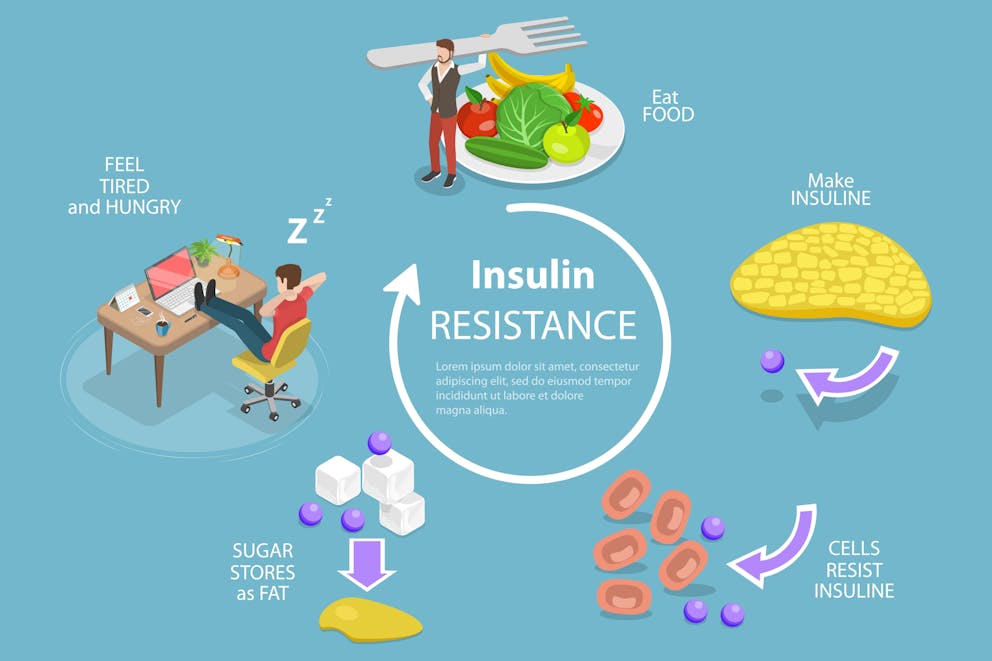Stalled Weight Loss Despite Intermittent Fasting
Picture this: You’ve committed to intermittent fasting. You’re excited by the potential to lose weight and experience health benefits. You follow your fasting and eating windows.
But then, disappointment strikes. The scale refuses to budge. You’re experiencing an intermittent fasting stall.
Understanding why this roadblock appears is the first step to busting through it. Our bodies are complex, constantly adapting to stimuli like fasting. Think about our ancestors facing periods of food scarcity.
These periods triggered survival mechanisms that helped them adapt and hold onto energy reserves (fat). Encountering an intermittent fasting stall isn’t necessarily a bad thing—it means those ancient mechanisms are kicking in.
This doesn't mean you should give up on your goals. You just need some insight to navigate this stall and get back to seeing progress.
I've helped countless people overcome their weight loss plateaus and unlock their fasting success, and I'm confident I can help you, too.
Why Am I Not Losing Weight With Intermittent Fasting?
Let’s unravel the mystery of why that scale hasn’t moved. Intermittent fasting, like any weight loss strategy, operates on the principle of calorie balance.
If your body consumes more calories than it expends, even during your eating window, weight loss will be stagnant or even reverse.
Top Reasons For an Intermittent Fasting Stall
Sometimes identifying the cause of a stall is the trickiest part. To help, I've outlined the most common culprits below:

1. Insulin Resistance
Insulin is a pivotal hormone that acts like a switch for fat burning. High insulin halts fat loss, while low insulin allows it to happen.
Intermittent fasting naturally lowers insulin levels, but this eating pattern may not be enough if you’re struggling with insulin resistance.
Insulin resistance is when your body isn’t using insulin effectively. This can throw a wrench into the whole process, leading to a stall. Extending your fasting window can address this.
The longer you fast, the more you encourage your body to tap into stored fat for energy, helping address insulin resistance.
Start with adding an hour or two to your current schedule. Pay close attention to your hunger cues and remember, consistency is more important than intensity.
2. Too Many Calories During Your Eating Window
This one’s pretty straightforward, though not always obvious. You might be surprised by how many calories sneak into your meals, especially if you haven’t fully adapted to a whole-foods-based way of eating.
Are processed foods, sugary drinks, or excessive healthy fats (nuts, avocados, olive oil) finding their way onto your plate?
Even healthy choices, consumed in excess, can tip the calorie scales against you. And remember, simply because a food is labeled “keto” or “sugar-free,” it doesn't give it a free pass.
These items often hide sugar alcohols or processed ingredients that can interfere with your progress.
3. Not Eating the Right Foods to Break a Fast
It's one thing to track calories, but have you ever considered what those calories are composed of? The types of foods you consume can play a significant role in managing insulin levels and losing weight with intermittent fasting.
Eating foods that cause blood sugar spikes can halt weight loss in its tracks. This is where the magic of low-carb, high-fat meals comes into play.
By incorporating healthy fats into your meals, such as avocados, nuts and seeds, and fatty fish, you help stabilize blood sugar levels, preventing insulin rollercoasters that can impede your progress.
Protein also plays a crucial role by increasing satiety, that feeling of fullness. Remember, this is not about deprivation—it's about nourishment. Load up on non-starchy vegetables. They are your secret weapon.
4. Lack of Sleep
Getting quality sleep is not just about feeling rested. It’s directly tied to hormone regulation, particularly those crucial hunger hormones leptin and ghrelin.
When you’re sleep-deprived, your body produces more ghrelin (the hunger hormone), while simultaneously decreasing leptin (the hormone that tells you when you're full).
Prioritize getting at least seven to nine hours of sleep. This will help balance your hormones, meaning you're more likely to make conscious, healthy choices throughout the day.
Remember, achieving deep sleep is as crucial as nailing your fasting schedule for weight loss.
5. Underlying Health Conditions
While the previous factors are significant contributors to an intermittent fasting stall, certain medical conditions can also play a role. This is why regular doctor visits and prioritizing a well-rounded approach to your health journey are essential.
These conditions might include hormonal imbalances (thyroid issues or polycystic ovary syndrome), metabolic disorders, or even nutrient deficiencies that require addressing with proper medical guidance. Keep in mind that everyone’s health journey is unique.
6. Stress and Cortisol Levels
Think of chronic stress as a silent saboteur to your intermittent fasting journey. Elevated cortisol levels not only have implications for our mood and energy levels, but they can throw our weight loss efforts off track, too.
Cortisol is often dubbed the “stress hormone.” Our bodies release cortisol in response to perceived threats or prolonged stress, sending signals to conserve energy and store fat.
In the context of our ancestors, this response made perfect sense—during times of famine or danger, storing fat meant a better chance of survival.
However, in today’s modern world, where stressors tend to be psychological rather than life-threatening, chronic cortisol elevation becomes problematic for our waistlines.
Prioritize stress management strategies. This can range from mindfulness techniques, yoga, nature walks, deep breathing exercises, journaling, and more. Discover what resonates with you and make it a non-negotiable in your daily routine.
7. Exercise Routine
Integrating regular exercise into your intermittent fasting regimen can make a noticeable difference in busting through those plateaus. Building lean muscle mass doesn't just improve your physique. It also increases your metabolic rate, which can help you lose weight.
This doesn't necessarily mean intense workouts are essential, especially when you're new to exercise or intermittent fasting. Begin by incorporating movement that you genuinely enjoy into your routine.
Walks in nature, swimming, dancing, cycling—any form of activity that gets your heart rate up can have significant benefits.
As you build strength and stamina, you can progressively challenge yourself with higher-intensity training. The key is consistency and making it enjoyable.
The information provided in this blog post or any linked materials is not intended nor implied to be a substitute for professional medical advice, diagnosis, or treatment. Always seek the advice of your physician or another qualified health provider.

Weight Loss Halt
Delve into the intricacies of intermittent fasting, identifying seven common barriers that may impede progress. From plateaus to misconceptions about meal timing, this guide offers practical solutions to maximize the benefits of intermittent fasting.
Moreover, it explores the intriguing concept of "Cheesecake Fat Bombs," low-carb, high-fat treats designed to satiate cravings without derailing dietary goals.
This comprehensive resource equips readers with strategies to navigate intermittent fasting effectively while indulging sensibly in delightful treats like Cheesecake Fat Bombs.
Breaking the Plateau
Addresses the common challenge of stalled weight loss despite efforts like intermittent fasting. This approach highlights the importance of understanding your unique body type to overcome such obstacles.
By taking a body type quiz, you can identify the specific characteristics and needs of your physique, allowing you to adjust your diet and exercise routines accordingly.
This tailored strategy not only helps in breaking through weight loss plateaus but also ensures a more sustainable and personalized path to achieving your health and fitness goals.
Conclusion
Experiencing an intermittent fasting stall can feel incredibly discouraging. But trust me—hitting a plateau isn't a full stop. Consider it a detour, not a dead end.
Take time to reflect. Evaluate your fasting and eating routine. By making a few simple tweaks and staying persistent, you’ll achieve the health you deserve. Remember, you have the power to transform your health.
Supporting Data
Previous blog
Bread vs Potato Whats WorseNext blog
Potato Chips vs Corn Chips Whats WorseTags

Popular
08/21/2024
55.7K views
02/23/2025
46.8K views
11/18/2024
281.2K views
03/18/2024
11/21/2022




